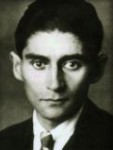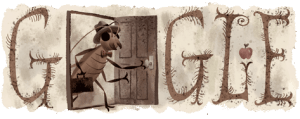|
|
Bulletin Board
Interesting Reading in the Interweb Tubes
- Revolution Blues (“What all these authors share is an antiquated focus on high politics and military battles, areas that contemporary historical research has basically forsaken as irrelevant to the greater questions the [American] Revolution raises.”)
Blog Headline of the Week
Bookish Links
Nonbookish Linkage
Am I getting smart with you? How would you know?
Daniel Tosh, True Stories I Made Up
I’m guessing I was in high school when I first heard the word “existential” or “existentialism.” Likewise, I’m guessing that was when I first grasped even a glimmer of what it meant — and I am still far from claiming comprehension. One thing I’ve always found unique about existentialism is fiction’s role in it. Ask almost anyone who knows something about the philosophy and names like Sartre, Camus and the one who struck me most, Franz Kafka, come to mind almost immediately. All this meandering comes about because today is the 130th anniversary of Kafka’s birth.
I’ve always found Sartre somewhat dense reading, even his fiction. Camus is okay but Kafka’s writing always sucked me in. My concept of existentialism is far more feel than definitional. And Kafka’s works seem to most embody that sense.
 Kafka puts his characters in situations that seem absurd and hopeless but in which they continue to struggle through their existence. That aspect of existentialism is a key part of my sense of it. Life is difficult, poses problematic questions about the human condition, and can seem meaingless. Anxiety and even despair often result. But when confronted with these situations, the human animal can only attempt to make something of it through their own actions. Although there’s a good chance those actions may not resolve the situation, both the freedom to make those decisions and their consequences are absolute. Kafka puts his characters in situations that seem absurd and hopeless but in which they continue to struggle through their existence. That aspect of existentialism is a key part of my sense of it. Life is difficult, poses problematic questions about the human condition, and can seem meaingless. Anxiety and even despair often result. But when confronted with these situations, the human animal can only attempt to make something of it through their own actions. Although there’s a good chance those actions may not resolve the situation, both the freedom to make those decisions and their consequences are absolute.
Take Josef K. of The Trial, Kafka’s most famous novel. An impersonal process has been set in motion for no comprehensible reason and Josef will struggle futilely against it. Likewise, in The Castle the protagonist is a land surveyor sent to survey the castle’s land but cannot reach it despite all his efforts to do so. In his most famous short story, “Metamorphosis,” Gregor never questions how or why he is transformed into a cockroach and Gregor’s life is such that he is trapped whether as a human or a grotesque insect. And, from my perspective, both situations seem to center around the decisions Gregor has made in his life. Then “In the Penal Colony” finds an outsider confronted with what he believes is an injustice but he is powerless to change. Still, while everything Kafka wrote is, by definition, Kafkaesque, it doesn’t all fit the meaning that term has today.
Lots of people read elements of Kafka’s life into his works, particularly his relationship with his authoritarian father. In fact, in a letter to his father — more than 100 pages long — that was never sent, Kafka said, “My writing was all about you.” It may well be that the relationship is a source of Kafka’s themes of alienation, oppression and isolation.
And while Kafka’s writing was a source of contention between he and his father, little of Kafka’s work was published before he died at age 40. In fact, none of his novels were published before then. The Trial was published the year after Kafka died and The Castle a year later. Before his death, Kafka left explicit instructions that all his writings “be burned unread.” His literary executor ignored those instructions and much of Kafka’s work, even unfinished, was published. Yet decades after his death, legal battles still occurred over ownership and treatment of Kafka’s papers.
A part of me is a bit offended that Kafka’s express instructions weren’t honored. At the same time, the world would have missed out on a lot had the executor obeyed. And given the anniversary of his birth, maybe it’s time I got back to his Complete Stories after having let it sit too long.
UPDATE:
Google marked the anniversary with the following on its search page:

You can hold yourself back from the sufferings of the world, that is something you are free to do and it accords with your nature, but perhaps this very holding back is the one suffering you could avoid.
Franz Kafka, Shorter Works, Vol. 1
I’m not brave or smart enough to come up with a list of the best five or ten books for the first half of the year. I can, however, provide a summary of my reading to date and what’s impressed me.
So far, I’ve read 64 books, equally divided between fiction and nonfiction totaling just more than 20,300 pages. Twelve were works in translation and, showing how far I’ve gone to the dark side, nearly three-quarters have been ebooks and only six have come from the library.
On the nonfiction side, my favorites of the books I’ve read this year would probably be Diary of a Man in Despair by Friedrich Reck, a diary of life in Nazi Germany from May 1936 through October 1944, and Mark Kurlansky’s Nonviolence: The History of a Dangerous Idea, a brief but worthwhile look at the concept of nonviolence as an idea, not a strategy. And although I though several of her earlier works were better, I probably would give Mary Roach’s Gulp: Adventures on the Alimentary Canal an honorable mention simply because I love the way she writes about science (in other words, helping me understand without making my brain hurt).
Foreign works head the fiction list. Stefan Zweig’s The Post-Office Girl is about a female post-office clerk struggling with life in 1920s Germany while George Simenon’s The Train is about a man who is separated from his wife and daughter while being evacuated on a train in 1940s France and then becomes enamored with a young Czech woman. Both have an existential ambiance, which may be what drew me in. The other book I probably should have read before — A Lesson Before Dying by Ernest J. Gaines. The setting and look at being black in the South in the 1940s is reminiscent of, but more direct than, To Kill a Mockingbird.
Perhaps one other item of note. Of these books, only Gulp and Diary of a Man in Despair were published this year and the latter actually is a reprint from New York Review Classics.
I have no more to say except this: We must live with our own conscience.
Ernest J. Gaines, A Lesson Before Dying
Can’t say anything I read this month really grabbed me. Of course, that might be the weather distracting me. Plus, it was another one of those months where I would pick up a book, read a couple pages and go look for something else. There were two, though, that I got a ways in before bailing on.
I seem to be having a streak with highly praised books — and not a good one. The latest is A Naked Singularity by Sergio De La Plava. The book hit all sorts of last year’s “Best Of” lists and had plenty of praise. The novel looks at the life of a Colombian public defender in Manhattan. The book clearly provides insights into the criminal court system but the roughly 20 percent of the novel I read spent as much time on digressions as moving forward. When you consider the book is nearly 700 pages long, you want to become immersed early and have the time fly by because you are so invested. Here, I felt more like I was wandering in chaos. The book also reinforced something I’ve been suspecting for a while. Although I’ve never read any Thomas Pynchon, if someone invokes Pynchon in a review (or, even worse, calls a book “Pynchonesque), odds are I won’t like it.
The other victim this month was a nonfiction work, Michael J. Totten’s Where the West Ends: Stories from the Middle East, the Balkans, the Black Sea, and the Caucasus. I’ve always had somewhat of a fascination with the latter three areas. The book is Totten’s account of travels in 13 countries, 11 of which were Communist. And, frankly, the book is interesting. My problem is that in the roughly one-third of the book I read, it too often read like Totten put down a tape recorder when he interviewed people and simply gave us a transcript. Thus, this is one I may not have been entirely fair to and there’s a chance it will pop back up on my Nook sometime down the road.
[I] read books because I love them, not because I think I should read them
Simon Van Booy, “What I Do When I’m Not Writing Books”
Interesting Reading in the Interweb Tubes
- How To Read More — A Lot More (“Reading must become as natural as eating and breathing to you. It’s not something you do because you feel like it, but because it’s a reflex, a default.”)
Lawsuits of the Week
Things Not to Do When On Trial
- A mistrial was declared in San Diego this week when a robbery suspect returned from a break with a plastic baggie filled human feces, smeared it on his attorney’s face and then threw more at the jury (via)
Bookish Linkage
Nonbookish Linkage
- If you want to be a broadcast intern in D.C., you better be able to run
- In my house there’s no doubt dogs are just furry kids — just ask our human kids
If you don’t own a dog, at least one, there is not necessarily anything wrong with you, but there may be something wrong with your life.
Roger Caras, A Celebration of Dogs
|
Disclaimer 
Additionally, some links on this blog go to Amazon.com. As an Amazon Associate I earn from qualifying purchases. There is no additional cost to you. Contact me You can e-mail me at prairieprogressive at gmaildotcom.
|
 Kafka puts his characters in situations that seem absurd and hopeless but in which they continue to struggle through their existence. That aspect of existentialism is a key part of my sense of it. Life is difficult, poses problematic questions about the human condition, and can seem meaingless. Anxiety and even despair often result. But when confronted with these situations, the human animal can only attempt to make something of it through their own actions. Although there’s a good chance those actions may not resolve the situation, both the freedom to make those decisions and their consequences are absolute.
Kafka puts his characters in situations that seem absurd and hopeless but in which they continue to struggle through their existence. That aspect of existentialism is a key part of my sense of it. Life is difficult, poses problematic questions about the human condition, and can seem meaingless. Anxiety and even despair often result. But when confronted with these situations, the human animal can only attempt to make something of it through their own actions. Although there’s a good chance those actions may not resolve the situation, both the freedom to make those decisions and their consequences are absolute.







